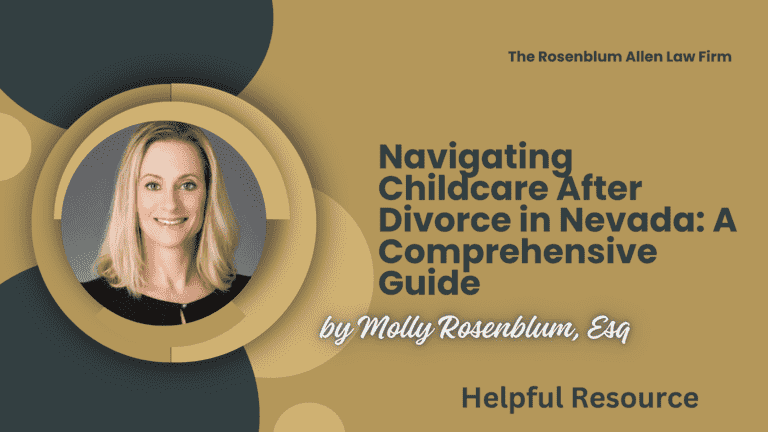Divorce is a challenging journey, not just for the couple but also for their children; in Nevada, where family dynamics are as diverse as its residents, understanding how to manage childcare after divorce is crucial.
This guide aims to provide clear, compassionate insights into the legal, financial, and emotional aspects of arranging childcare in the post-divorce landscape of Nevada.

Understanding Nevada’s Legal Framework for Childcare Post-Divorce
Nevada’s laws play a significant role in shaping how childcare is approached after a divorce. Knowing these laws helps make informed decisions that are in the children’s best interest.
Custody Types in Nevada: Joint vs. Sole Custody
Nevada has two main types of custody: joint and sole custody.
- Joint Custody: Both parents share responsibility for the child. This arrangement requires cooperation in decision-making regarding the child’s welfare.
- Sole Custody: One parent has the primary responsibility for the child. The other parent might have visitation rights but is not involved in decision-making.
Legal Considerations for Determining Childcare Arrangements
When deciding on childcare arrangements, courts in Nevada consider various factors:
- The child’s preference is if the child is of sufficient age and capacity to form an intelligent choice.
- The level of conflict between the parents.
- The ability of the parents to cooperate to meet the child’s needs.
- The mental and physical health of the parents.
- The child’s physical, developmental, and emotional needs.
Financial Aspects of Childcare After Divorce
The financial responsibilities of raising a child after divorce are governed by child support laws in Nevada.
Child Support Laws in Nevada: How They Impact Childcare Expenses
Nevada uses a formula to determine child support, considering factors such as:
- The income of both parents.
- The number of children.
- Special needs of the child, if any.
Calculating Child Support: Factors Considered in Nevada
Child support calculations can be complex. Key elements include:
- Parent’s Gross Monthly Income: Each parent’s income is assessed to calculate the support amount.
- Number of Children: The more children involved, the higher the percentage of income that goes towards child support.
- Healthcare and Educational Expenses: These are often split between parents in addition to regular support payments.
Financial Assistance Options for Childcare Post-Divorce
For parents facing financial difficulties, there are options:
- State Assistance Programs: Programs like Temporary Assistance for Needy Families (TANF) can provide financial support.
- Childcare Subsidies: These can help cover part of the childcare costs.
- Sliding Fee Scales: Some childcare providers offer reduced rates based on income.
Co-parenting and Childcare Arrangements
After divorce, co-parenting becomes a new way of life. It’s about teamwork, even when it’s hard. Good co-parenting means making decisions together for your child’s happiness and well-being.
Effective Communication Strategies for Co-Parenting
- Be Clear and Respectful: Speak and listen with respect. Clear communication helps avoid misunderstandings.
- Plan and Organize: Use calendars or apps to keep track of schedules, events, and appointments.
- Stay Positive: Focus on your child’s needs, not past conflicts.
Creating a Successful Childcare Schedule: Tips and Best Practices
- Be Flexible: Plans change, and being flexible helps keep things smooth.
- Consider Your Child’s Routine: Keep your child’s school, activities, and sleep schedule in mind.
- Holidays and Special Days: Plan for holidays, birthdays, and school breaks.
Navigating Childcare Services in Nevada
Finding the right childcare is essential. There are many options in Nevada, but picking the right one takes some research and thought.
Types of Childcare Services Available in Nevada
- Daycares and Childcare Centers: Good for social skills and structured activities.
- In-Home Childcare: A more personal, home-like setting.
- Before and After School Programs: Great for school-age kids.
Evaluating and Choosing the Right Childcare Provider
- Visit and Observe: See the place in action. Is it clean, safe, and happy?
- Ask Questions: Learn about their policies, staff qualifications, and emergency plans.
- Check References and Reviews: Hear from other parents about their experiences.
State Resources and Programs to Assist with Childcare
- Nevada’s Child Care and Development Program: Offers resources and assistance for childcare.
- Childcare Aware of America: Provides information on choosing quality childcare.
Legal Assistance and Resources
Sometimes, you need a little extra help. If you’re facing legal issues with childcare after divorce, seeking professional advice is okay.
When to Seek Legal Advice for Childcare Issues Post-Divorce
- Changes in Custody Agreements: If you need to change your custody plan.
- Child Support Issues: If there are problems with child support payments.
- Conflicts and Disagreements: If you can’t agree on childcare arrangements.
Finding a Family Law Attorney in Nevada Specializing in Childcare
- Look for Experience: Find a lawyer who knows family law and childcare issues.
- Ask for Recommendations: Friends, family, or local bar associations can suggest good lawyers.
- Consultations: Meet with a few lawyers to find the right fit for you.
Community and Online Resources for Divorced Parents
- Support Groups: Meet other parents who understand what you’re going through.
- Online Forums and Blogs: Find tips, stories, and advice from others in similar situations.
- Local Community Centers: They often have programs and workshops for single parents.
Coping and Support for Parents and Children
Divorce isn’t easy, and it’s okay to feel overwhelmed. Remember, taking care of yourself helps you better care of your kids.
Emotional Impacts of Divorce on Children and Parents
- Talk About Feelings: It’s important to talk about your strengths. Listen to your children, too.
- Be Patient: Healing takes time. Be gentle with yourself and your kids.
- Stay Active and Connected: Keep doing things you love. Stay connected with friends and family.
Support Groups and Counseling Services in Nevada
- Counseling: Professional help can guide you through tough times.
- Support Groups: Sharing with others who understand can be very comforting.
- Community Resources: Libraries, schools, and community centers often have information on local support services.
Strategies for Helping Children Adjust to New Childcare Arrangements
- Keep a Routine: Regular schedules make things predictable and comforting.
- Encourage Open Communication: Let your child talk about their feelings.
- Stay Involved: Be part of their new routine as much as possible.

Breaking It All Down for You
Divorce brings changes, but you can navigate childcare and co-parenting successfully with the correct information and support. Remember, you’re not alone. Nevada offers many resources to help you and your children adjust and thrive.

Frequently Asked Questions
What steps should I take if my ex-partner isn’t following our agreed-upon childcare schedule?
If your ex-partner isn’t adhering to the childcare schedule, try discussing the issue calmly to understand their reasons. If this doesn’t resolve the problem, consider mediation or legal advice for enforcing custody agreements.
How do I handle childcare during unexpected events or emergencies?
Have a clear plan for emergencies in your co-parenting agreement. This includes who to contact, how to communicate, and how to make quick decisions about your child’s care.
Can grandparents or other relatives be involved in childcare post-divorce?
Yes, grandparents and other relatives can play a role in childcare. Including them in your plans is essential if they are a consistent part of your child’s life. Both parents should agree upon their involvement.
How do I manage childcare costs if my financial situation changes after the divorce?
If there’s a significant change in your financial situation, you may request a review of your child support arrangement. Document your financial changes and seek legal advice on how to proceed.
What should I do if my child struggles to adjust to the new childcare arrangement?
Consider talking to a child psychologist or counselor if your child is struggling. Maintain open communication with your child and reassure them with consistent routines and support.
Are there specific laws regarding international travel with my child after divorce in Nevada?
Yes, Nevada has laws regarding international travel with a child post-divorce, especially concerning parental consent. It’s advisable to consult with your attorney to understand these laws before planning any international trip.
How can I ensure my child maintains a strong relationship with both parents despite the divorce?
Encourage regular communication and interactions with both parents. Avoid speaking negatively about the other parent and support your child’s relationship with them.
What are some signs that my child might need professional help adjusting to the divorce?
Signs may include changes in behavior, mood swings, decline in academic performance, withdrawal from friends or family, or expressing feelings of sadness or anger frequently.
How do I deal with conflicting parenting styles after divorce?
Respect the other parent’s style unless it harms the child. Discuss major concerns directly with your ex-partner and consider mediation for unresolved issues.
What should I consider when introducing a new partner to my child post-divorce?
Take it slow and consider your child’s feelings. Talk to your child about your new partner and ensure they’re comfortable with the introduction. Coordinate with your ex-partner if necessary.
How do I stay updated with my child’s activities and progress in school post-divorce?
Establish a communication channel with your child’s school. Attend parent-teacher meetings and school events. You can also set up a system with your ex-partner for sharing this information.
Is it normal to feel guilty about the impact of divorce on my child?
Feeling guilty is normal, but it’s essential to recognize that you can still be a great parent despite the divorce. Focus on providing love, support, and stability for your child.

Glossary
Custody: The legal right to decide about a child’s welfare and upbringing. It is often divided into physical custody (where the child lives) and legal custody (who makes important decisions about the child’s life).
Joint Custody: A form of custody where both parents share the responsibility and decision-making for their child.
Sole Custody: A custody arrangement where only one parent has the primary responsibility for the child, including decision-making rights.
Co-parenting: The act of two parents working together to raise a child following separation or divorce. It involves shared decision-making and collaboration for the child’s welfare.
Child Support: Financial payments made by one parent to another are intended to contribute to the costs of raising a child.
Mediation: A process where a neutral third party (mediator) helps parents resolve disputes and reach an agreement about childcare and custody issues.
Parenting Plan: A written agreement between parents outlining the details of child custody, visitation, and other parenting arrangements.
Visitation Rights: The right of a non-custodial parent to spend time with their child, as determined by a custody agreement or court order.
Childcare Subsidies: Financial assistance provided by the government or other organizations to help cover the cost of childcare.
Family Law Attorney: A lawyer specializing in matters relating to family law, including divorce, child custody, and child support.
Child Custody Agreement: A legal document outlining a child’s terms of custody and visitation, including where they will live and how decisions about their upbringing will be made.
Parental Consent: Legal permission given by a parent or guardian, often required in situations like international travel with a child after divorce.
Child Psychologist: A professional specializing in the mental health and emotional well-being of children, often consulted in cases where a child is having difficulty adjusting to divorce.
Parent-Teacher Meetings: Meetings between parents and teachers to discuss a child’s academic progress, behavior, and social development at school.
Emotional Support: Assistance and comfort provided to someone dealing with emotional difficulties, often crucial for children and parents during and after a divorce.
Additional Resources for You

Our lead attorney, Molly Rosenblum Allen, Esq., has not only been a steadfast advocate for our clients but has also developed a wealth of resources to guide individuals through challenging times. To support our readers in navigating the complexities of family law, we present the following resources meticulously crafted by Ms. Allen:
Las Vegas Divorce Attorney: A comprehensive guide tailored for those facing divorce proceedings in Las Vegas, providing in-depth information and strategic advice. Learn more.
Nevada Divorce: An extensive resource for understanding the nuances and requirements of divorce proceedings within the state of Nevada. Explore here.
Surviving Divorce: Empowering individuals with strategies and advice to not only endure but also thrive during and after a divorce. Find support here.
What Happens If You Don’t Sign Divorce Papers: A focused exploration of the legal and personal implications of refusing to sign divorce papers. Get informed.
Do I Need an Attorney to Get a Divorce: Offering clarity on the importance and benefits of legal representation in divorce proceedings. Understand your needs.
What is a Collaborative Divorce: Demystifying the concept of collaborative divorce and how it can lead to a more amicable resolution. Discover more.
How to Win a Divorce: Strategic insights into navigating your divorce with a mindset geared towards achieving favorable outcomes. Learn strategies.
Switching Lawyers During Divorce: Guidance on the process and considerations involved in changing legal representation mid-divorce. Consider your options.
How Long Does a Divorce Take in Nevada: An analysis of the timeline one can expect for divorce proceedings in Nevada. Get a time estimate.
High Conflict Divorce: Insights and strategies for navigating the turbulent waters of a high-conflict divorce. Navigate the challenge.
Questions to Ask a Divorce Lawyer: An invaluable list of questions to ensure you’re fully informed and prepared when consulting with a divorce lawyer. Prepare for consultation.
We encourage our readers to utilize these resources, understanding that each step with Molly Rosenblum Allen, Esq., is a stride towards a more informed and empowered future.

Offsite Resources You May Find Helpful
Here are seven offsite resources related to childcare and legal issues following a divorce that you might find useful:
American Bar Association: This site offers a wealth of legal resources, including information on family law and child custody issues. American Bar Association
Child Welfare Information Gateway: An excellent resource for information on child welfare, including aspects of childcare post-divorce. Child Welfare Information Gateway
Legal Aid Center of Southern Nevada: This organization provides legal assistance and resources, particularly useful for residents in the Nevada area. Legal Aid Center of Southern Nevada
National Association of Counsel for Children (NACC): NACC offers resources and support for legal issues affecting children, including those arising from divorce. National Association of Counsel for Children
KidsHealth from Nemours: Provides valuable information on helping children cope with divorce, which can be crucial for parents navigating childcare. KidsHealth from Nemours
Psychology Today: Offers a directory of therapists, which can be a great resource for finding counseling services for both parents and children post-divorce. Psychology Today
National Parent Helpline: A helpline offering emotional support and resources for parents, which can be invaluable during and after the divorce process. National Parent Helpline
These resources can provide additional support and information to help navigate the complexities of childcare and legal matters following a divorce.

A Special Message From Our Lead Attorney
Why You Might Need a Lawyer
Molly Rosenblum, Esq

Dear Reader,
Thank you for taking the time to explore our comprehensive guide on navigating childcare after divorce in Nevada.
We understand this is a challenging period in your life, and having the correct information and support is crucial to making informed decisions for you and your family.
Please don’t hesitate to reach out if you need further assistance or legal advice tailored to your unique situation. My team and I at The Rosenblum Allen Law Firm are here to provide you with the guidance and representation you need.
To get the ball rolling on addressing your specific needs, call us at (702) 433-2889. We are committed to helping you through this process with the care and attention you deserve.
Warm regards,
Molly Rosenblum, Esq.









